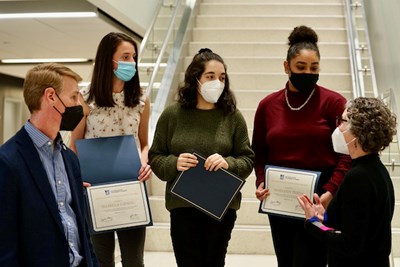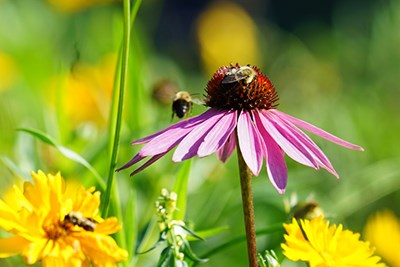Seven Sustainability-Minded Projects Receive a Share of $50K Fund
 Image by Ed Brennen
Image by Ed Brennen
05/02/2022
By Ed Brennen
An interactive plant wall, a labyrinth garden and a test site for an innovative fertilization system were among seven student, faculty and staff-led projects to be awarded a share of this year’s $50,000 Sustainability Encouragement & Enrichment Development (S.E.E.D.) Fund.
Started in 2017 by the Office of Sustainability, the S.E.E.D. Fund provides up to $10,000 in grants to projects that advance the university’s sustainability goals. The grants are awarded by a student-majority committee and supported by student sustainability fees.
“Student involvement is what really makes the difference,” says Ruairi O’Mahony, executive director of the Rist Institute for Sustainability & Energy (RISE).
Several of this year’s projects once again included collaborations with community partners, which O’Mahony says is “a testament to the stellar work that takes place on campus” to address sustainability and energy problems.
“We need these new ideas and new initiatives every year if we’re going to have any chance of meeting our goals not only on campus, but quite frankly at the state, federal and global level,” he says.
This year’s grant-winners were recently recognized during a ceremony at the Allen House. The projects included:
Interactive Plant Wall: Rosemary Louro, a junior public health major, received $10,000 to install a plant wall — a vertical garden with a built-in irrigation system — in a building on campus.
“Academic studies show bringing the outdoors inside makes any environment more relaxing and reduces stress,” says Louro, chair of health and wellness for the Student Government Association. “Plant walls also lower ambient temperature and noise, which can assist in keeping building on campus sustainable.”
Louro will work with Facilities Management to identify a location for the plant wall. She hopes to have it installed in the fall.
Green Schools Energy Modeling: With support from a $10,000 S.E.E.D. grant, UML mechanical engineering students will build a computer model of the energy systems in a Lowell public school building, providing a roadmap for energy-efficiency interventions.
Led by Katherine Moses ’12, energy manager for the City of Lowell, and Craig Thomas, assistant director for sustainability at UML, the project is a continuation of the Lowell Green Community Partnership.
 Image by Ed Brennen
Image by Ed Brennen
Green Fertilizer: Energy engineering Ph.D. students Benard Tabu, Samuel Alpert and Visal Veng received $8,000 to install and test their environmentally friendly, on-demand fertilizer system at the Rist Urban Agriculture Farm on East Campus.
Working with Mechanical Engineering Assoc. Prof. Juan Pablo Trelles and Electrical Engineering Assoc. Prof. Cordula Schmid, the students are developing a system that uses solar energy, water, air and plasma to produce nitrate-rich fertilizer that is better for the environment than fertilizers currently on the market — and also addresses the problem of food insecurity in developing countries.
“We are so excited to help change the way fertilizer is produced, increasing access for vulnerable people and making the world a better place for everyone,” Tabu says.
The students, who will collaborate with the Rist Institute for Sustainability & Energy and Mill City Grows at the test site, won the $4,000 Commitment to Sustainable Environment award at last year’s DifferenceMaker $50,000 Idea Challenge.
Food Forest: Mechanical engineering major Alana Smith received $7,500 to grow a seven-layer “permaculture design for edible plants” in the backyard of the Centers for Women and Work, located at 150 Wilder St. on South Campus.
“Having different layers and different functions creates a balanced system where plants work together rather than compete, which is why food forests can produce such a high yield in a small space,” says Smith, who envisions the space as a place for students, faculty, staff and community members to learn about sustainability — while also serving as a source of fresh food.
 Image by Ed Brennen
Image by Ed Brennen
Labyrinth Garden: Assistant Director of Student Life & Well-Being Hannah Monbleau received $7,500 to create a quiet and reflective space on campus where students can improve five of the dimensions of wellness: emotional, environmental, physical, social and spiritual well-being.
“We’re excited for students to be able to practice mindfulness, connect with nature and improve their well-being,” says Monbleau, who will work with Facilities Management this summer to identify an area on campus for the garden. She will also gather input from students, faculty and staff on what they would like to see in the garden. Construction could begin in the fall, with the space opening next spring.
Eco-Informed Engineering Design for a Sustainable Future: Mechanical Engineering Assoc. Prof. Christopher Hansen received $5,000 to license the ANSYS Granta EduPack, a software tool that enables undergraduate students to compare the eco-impacts of their design decisions.
“The key for a future with lower emissions, reduced toxicity and increased reuse and recycling of materials depends on the skills we instill in our undergraduate students today,” Hansen says. “If engineering students can become skilled in sustainability as a natural step in the design process, the next generation of engineers will reduce or eliminate the use of unsustainable materials, processes and products.”
Hansen will work with the Information Technology office to install the software on vLabs, making it available to all mechanical engineering students for the 2022-23 academic year. He also plans to work with University Advancement to identify funds for future licensing of the software.
Green Dream Dorm: Environmental science major Isabella Giesing received $2,000 for her project to reduce energy usage in residential buildings. The project, which was recognized earlier this year at the third annual Rist Institute for Sustainability & Energy Climate Mitigation Challenge, aims to help students develop lifelong energy-saving habits.
It proposes to update Residence Life guidelines and implement a rental program for energy-efficient appliances. It also seeks to install energy-tracking kiosks in each building, providing real-time data that could be used to incentivize students through competitions.




